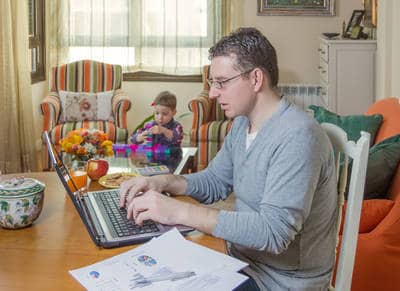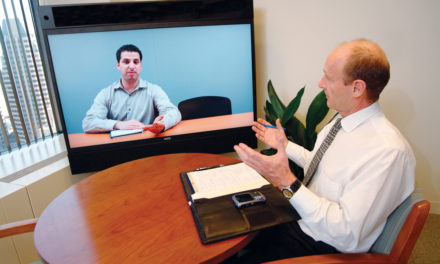For years human resources experts and transportation analysts predicted a nationwide “boom” in telecommuting. The technology was in place and many companies offered their employees the option of working from home
But it never happened. While some 50% of US employees do telecommute for some part pouf the week, the number that do so full-time is still below 5% -- and it hasn’t grown all much in recent years.
Now the growing threat of the corona virus may change all that.
Short term, many companies including most of the federal government are
insisting that their employees not come into work to reduce the crowding linked to the spread of the virus.
Employees that would never have considered the telecommuting option are now finding themselves camped out at their kitchen or dining room table, sometimes still wearing their pajamas, and performing their work as normal.
Or trying to. For many the sudden shift to mandatory telecommuting has only added to their daily stress.
Eric Penner, who works as a senior IT analyst at the Food and Drug Administration, says being home with his wife, a small business owner who typically works by herself in their small living room in their house in northern Virginia is beginning to strain their marriage and family life.
“We’re just not used to being around each other all day and we also have to help school the kids now. I have to take several walks a day just to deal with it all,” he says.
Telecommuting, even under normal circumstances, poses a problem for many workers. While they no longer have to commute, they can find themselves easily distracted at home, but also left feeling isolated without the usually workplace interaction. Some workers need the structure and routine of office life just to perform their jobs, studies show
Other workers are just the opposite. They freely choose to telecommute because it offers them flexibility. They can choose to work in spurts and when they are most motivated to do so.
In fact, most studies show that telecommuting workers do tend to be more productive than their office-bound counterparts.
Not all industries and occupational niche are geared to telecommuting. Transportation workers, including bus drivers, need to be on the road each day, and hotel and restaurant workers must still show up for their regularly scheduled shifts.
But many jobs formerly thought to require an office setting, like health care, are shifting increasingly to work-at-home status.
Many HR specialists are beginning to see how the corona virus threat might create a tipping point that convinces a much larger percentage of the workforce to embrace permanent telecommuting voluntarily
People who must commute long distances will become accustomed to not coming in, they
say. And with sharply reduced highway traffic and pollution, the broader social and environmental benefits of telecommuting will also become apparent.
Currently, most permanent telecommuters are not married or their spouse works outside the home. The kinds of issues the Penners are starting to deal with may not even come into play.
Penner himself says he has little interest in telecommuting in the future, even if he could.
“What I really don’t like is having a work computer in my home. In fact, I am more closely monitored here than at the office, and I feel my privacy is being invaded,” he says.
In fact, telecommuting might prove less confining and stressful once the threat of the virus passes. Many telecommuters enjoy working from nearby coffee shops or local libraries, rather than their own homes. Currently, most of these venues are closed or have restricted or no seating.
There is precedent for workplace patterns among a minority of employees spreading more widely. In the 1990s when some IT companies began allowing workers to dress casually, the trend quickly spread to other industries, and eventually nationwide.
Many say that will never happen with telecommuting, mainly for cultural and psychological reasons. Many workers actually relish office life, and the rituals associated with it.
“They’d have to make telecommuting mandatory for me to do it,” Penner says. “I doubt the government would do it across the board. If they did, many people would start looking look for another job.”
Latest posts by Stewart Lawerence (see all)
- Thanks To The Corona Virus, Telecommuting Is Now A Critical Strategy - March 22, 2020













